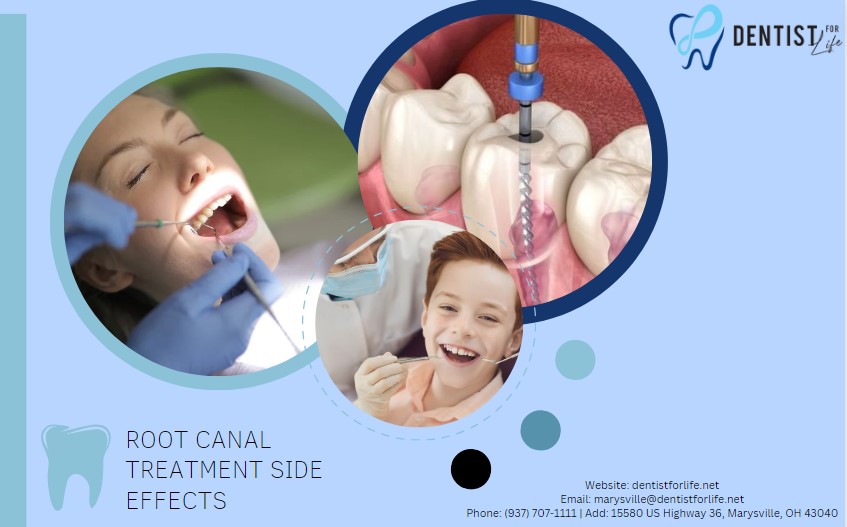Root canal treatment is a commonly performed dental procedure aimed at saving a severely damaged or infected tooth. While it is highly effective in alleviating pain and preserving natural teeth, understanding the potential “root canal treatment side effects“ is essential.
When do you need a root canal?
Root canal treatment, also known as endodontic therapy, is needed when the pulp of a tooth becomes infected or damaged. The pulp is the innermost part of the tooth, containing nerves, blood vessels, and connective tissue. When it becomes compromised, typically due to infection or severe decay, a root canal may be necessary. Here are some common situations in which you might need a root canal:
- Severe Toothache
- Sensitivity to Hot or Cold
- Swelling or Abscess
- Discoloration of a tooth, often turning it gray or dark yellow
- A traumatic injury to a tooth
- Deep Decay
It’s crucial to consult with a dentist or endodontist if you experience any of these symptoms. They will perform a thorough examination and determine if a root canal is the appropriate treatment to save the tooth and relieve your pain or discomfort. Root canal therapy can often prevent the need for tooth extraction and allow you to maintain a healthy smile.
See More: Root canal treatment

Root canal risks – Sinus congestion
Every part of your body is interconnected, including your teeth. This includes the possibility of root canals causing sinus issues.
Sometimes, there can be a slight leakage of fluid from your jaw into the membranes of your nose. While this may not sound pleasant, it can occur because the root canal and sinus cavity are in close proximity.
Although this is not a life-threatening condition, it can result in sinus inflammation, leading to symptoms such as headaches and congestion.
Root canal risks – Tooth cracking
Root canal treatment weakens teeth compared to their pre-infection state. The procedure involves removing the living parts of the tooth, causing it to essentially die. Consequently, teeth may become more fragile.
The dental pulp plays a crucial role in nourishing and moisturizing the tooth. To restore strength to the outer area of the tooth, dental crowns are commonly suggested after a root canal procedure.
See More: How Long Does a Root Canal Take
Root canal risks – Other complications
In a very rare occurrence, the root canal procedure may temporarily disrupt the nerves surrounding the affected tooth, potentially leading to numbness in the area. Rest assured, this is typically a temporary issue that tends to resolve within a few weeks.
Another aspect to consider is the possibility of an allergy to anesthesia. If you’ve previously had an allergic reaction to anesthetic during any medical procedure, it’s vital to promptly inform your dentist.

The Long-Term Side Effects of Root Canal Treatment
Root canal treatment is a common dental procedure used to treat infected or damaged teeth. While the procedure is generally considered safe and effective, there are some potential long-term side effects to be aware of.
- Tooth Fracture: In some cases, a tooth that has undergone root canal treatment may become more brittle and prone to fractures. This is because the procedure involves removing the dental pulp, which can weaken the tooth structure over time.
- Discoloration: After a root canal, the treated tooth may become discolored compared to the surrounding teeth. This is often a result of the materials used during the procedure or the removal of the dental pulp.
- Persistent Infection: In rare cases, a root canal treatment may not completely eliminate the infection. This can lead to persistent or recurrent infection, which may require additional treatment or even tooth extraction.
- Numbness or Tingling: In some cases, patients may experience numbness or tingling in the lips, tongue, or chin due to nerve damage during the procedure. While this is rare, it can be a potential long-term side effect.
It’s important to note that not all individuals will experience these side effects, and many people undergo root canal treatment without any complications. If you have concerns about the long-term side effects of root canal treatment, it’s best to consult with your dentist or endodontist for personalized advice and information.
See More: Root canal vs extraction
FAQ:
Do root canals cause health problems?
Root canals are a common dental procedure and are generally considered safe. However, in rare cases, complications can occur, such as infection or damage to surrounding tissues. It’s important to discuss any concerns or questions about root canals with a qualified dental professional.
Is Root Canal Treatment Serious?
Root canal treatment, also known as endodontic treatment, is a serious dental procedure. It is typically recommended when the dental pulp, which contains nerves and blood vessels, becomes infected or damaged. During the procedure, the infected pulp is removed, and the tooth is cleaned and sealed.
While root canal treatment may sound intimidating, it is a common and effective way to save a tooth and relieve pain. With advancements in dental technology and anesthesia, the procedure is generally well-tolerated and relatively painless.
However, it is important to note that every case is unique, and the complexity of the treatment can vary depending on the specific situation. It is always best to consult with a qualified dentist or endodontist to assess your individual needs and determine the best course of action.
Remember, maintaining good oral hygiene practices and seeking regular dental check-ups can help prevent the need for extensive dental procedures like root canal treatment.
How to minimize risks from root canal treatment
At DenTist For Life Dentistry, our commitment to your oral health is unwavering. We understand that the decision to undergo a root canal treatment can be a significant one, and concerns about potential side effects are natural. Through this discussion on “Root Canal Treatment Side Effects,” we aimed to provide you with valuable insights and information to ensure you approach your treatment with confidence and knowledge.
Our experienced team is dedicated to minimizing any potential side effects and maximizing your comfort throughout the process. We believe that well-informed patients make the best decisions about their dental care. Should you choose us as your dental care provider, you can trust in our expertise, state-of-the-art technology, and compassionate approach to ensure your root canal treatment is a positive and successful experience.



